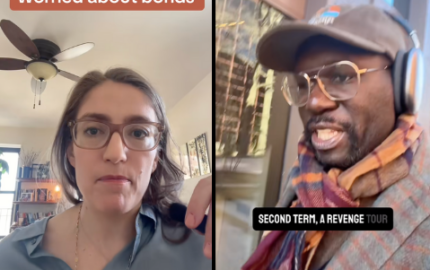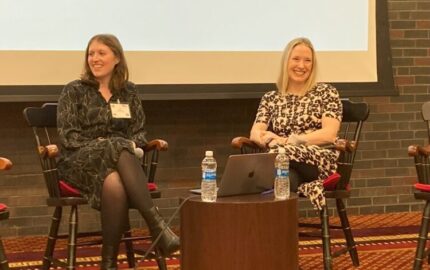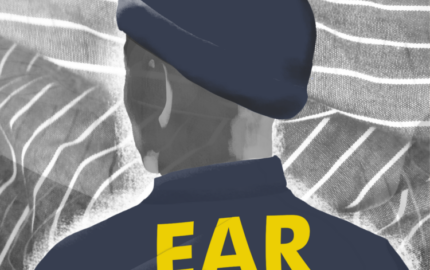Editor’s Note: Every other fall, hundreds of radio producers, journalists, documentarians and other audio artists gather in Chicago for the Third Coast conference to examine, explore and celebrate the world of audio storytelling. In the first of a series of dispatches from the 2014 conference, which took place last week, radio producer Julia Barton writes about a panel discussion on the question of where storytelling and journalism meet-- and collide-- in audio.
The session, called “Journalism and Storytelling: Frenemies?,” featured moderator Joe Richman, founder and producer of Radio Diaries, which gives people tape recorders to report their own lives; Brooke Gladstone, the co-host and managing editor of the public radio program “On the Media;” Roman Mars, host and creator of the podcast “99% Invisible;” and Andrea Silenzi, senior producer of Slate’s daily news show, “The Gist,” and host of the radio program “Why Oh Why?”.
Part of what makes the Third Coast International Audio Festival so intense, I’ve come to believe, is the lonely nature of life as an audio producer. Much of the world doesn’t understand the basics of what happens between our headphones and computer screens, and that creates a haze of silence around the professional decisions we have to make every day.
Many of those decisions have to do with interview tape: what to keep, what to remove, and how to balance the needs of a story’s framework while remaining honest to people who have trusted us with their voices.
So it’s a relief to be in a room full of people who “get” these problems—problems which are at their core ethical. Radio Diaries producer Joe Richman started off the festival with a lively discussion of ethics, although he and the other panelists all agreed that “codes of behavior” is perhaps a better term for what audio producers need to develop.
It was fascinating to hear where people draw the line in their own work. “On the Media” co-host and managing editor Brooke Gladstone will cut and re-arrange an interview for length and clarity, and she’s a vicious excisor of “ums” and pauses (disclosure: I temped once as a producer at “On the Media”). But she’ll never insert a pause to slow an interview down.
“A pause suggests emotional moment,” Gladstone said. “To put one in would be like putting a word in the mouth of the person.”
But each story comes with its own set of dilemmas. In his "Radio Diaries" documentary series on Nelson Mandela, Richman included an interview about curfews in apartheid South Africa. At the sound of an evening bell, blacks knew they had to get off the streets. Richman found a 1940s record of church bells in Johannesburg to mix under the moment when the interviewee recalled the sound of the bell.
“You shouldn’t cheat, you shouldn’t take shortcuts,” Richman said. “Still, what if all I could find were bells from 1950s in Durban? Or Nigeria? Or Poughkeepsie?” In other words, when would the audio demands of the story lead us too far astray?
“He’s going ‘bong bong bong,’ and if you didn’t have ‘bongs’ in there, you’d go crazy!” Gladstone exclaimed. But “the closer you can get to his situation is best. That’s your goal as a documentarian.”
“Poughkeepsie is too far,” “99% Invisible” host Roman Mars said. “That is your limit.”
What made this panel especially useful (and not a bloated discussion of ethics in audio journalism) was its nod to producers who inhabit a still-murky creative realm between audio fiction and verité. We tend to trust that voices we hear on the radio are who they say they are, but some producers like to play with that assumption.
In addition to producing Slate’s “The Gist,” Andrea Silenzi produces a live program and podcast “Why Oh Why?” at WFMU, a freewheeling, all-volunteer station in New Jersey. Silenzi played a moment with a recurring guest on her show named Randy. At Silenzi’s request, Randy sized her up as a possible date: “You are a little stumpy,” he declares. “But you have a clean, rural smell.” Randy’s so creatively obnoxious that some suspect he’s an acted character rather than a “real” person. But Silenzi won’t say whether he’s real or not.
Gladstone was not sure she liked that. “It’s possible to have a relationship with your audience where things are ambiguous,” she told Silenzi. “But if the energy is dependent on the authenticity, then that might be a violation [of trust].”
But for Silenzi—at least in the context of “Why Oh Why?”—toying with authenticity is part of a new media literacy that can be pleasurable. “I think people do know to ask, ‘Is it real?’ now with the Internet,” she said. “It’s this fun process where you imagine if it’s real and then ask whether it’s not.”
And artifice is baked into what we do anyway, said Roman Mars. “When you introduce microphones to real world, it becomes inauthentic. The craft is working back to making it feel real again.”
Julia Barton is a longtime public media editor, working with "Life of the Law," American Public Media, "99% Invisible," and individual producers. She's also been the managing editor of Radiotopia, a podcast collective from PRX. Barton's reporting has appeared on "Radiolab," "99% Invisible," "Studio 360," PRI's "The World," and other programs. She lives in Brooklyn in life, online at juliabarton.com.


